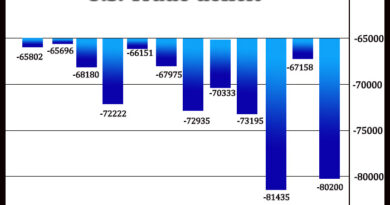China’s radical shift could burst its property bubble
China’s property development crisis appears to have spawned something deeper; a reappraisal and overhaul of the model that has driven China’s domestic economy for decades.
By itself the parlous state of the development sector, led by the failing state of the country’s most indebted property company, Evergrande, would have forced the authorities to reconsider the central role – close to 30 per cent of GDP – that property plays in the economy.
Introducing a property tax, even if it is limited to urban China and to the wealthier cities, in a property market downturn where sales and prices are slumping and the development sector is teetering, is a bold and risky move.Credit:AP
Formal and informal defaults on their debts by Evergrande, Simic Holdings, Fantasia Holdings and Modern Land and a raft of others have undermined the funding model that has powered the sector into the world’s biggest property market; one that accounts for about two-thirds of urban Chinese households’ wealth.
By missing interest payments on their debts, the developers have effectively blown up the funding from pre-selling properties before they are built and lost their access to the offshore bond funding market that has provided them with more than $US200 billion ($267 billion) of debt.
They’ve also injected fear into the market. Property buyers aren’t putting up the funds for undeveloped projects and so, not surprisingly, sales are slumping and prices of existing properties are falling.
In September, traditionally a peak month for the market, sales were down 17 per cent on the same month last year. The prices for new homes were only down 0.08 per cent but that was the first fall in six years.
Property really matters in China. The market is more than twice the size of the US property market because about 90 per cent of households are property owners and, in urban China, most households own more than one property. It is the major repository of household wealth, accounting for about 70 per cent.
It is also the major source of local governments’ income. Last year local governments raised about $US250 billion from selling and leasing land to developers.
While the immediate crisis around Evergrande eased last week when it made the $US83.5 million interest payment on US dollar bonds a day before the 30-day grace period ahead of a formal default expired, within a few days the grace period on another $US45 million payment runs out and by the middle of next month there’s almost a further $US150 million of overdue payments to be met.
Next year, with $US7.4 billion of repayments due, the challenge will only steepen. Despite its woes Evergrande, according to state media, has restarted work on 11 apartment projects.
Evergrande is one of many property developers in dire straits.Credit:Bloomberg
It’s unclear where the cash for the coupon payment and the developments has come from – a proposed $US2.6 billion sale of an interest in its property services business and another $US1.7 billion sale of a building in Hong Kong have both fallen through – but, with $US305 billion of debt,
Evergrande is destined to be wound down, with the authorities trying to minimise the fallout.
Evergrande might the largest and most high-profile of the troubled developers but its existential challenges extend throughout the sector.
The implosion in the property development sector has occurred even as Xi Jinping has begun imposing a new economic model on China, pivoting from Deng Xiaoping’s “socialism with Chinese characteristics” and “let some people get rich first” mix of socialism and capitalism to Xi Jinping’s more conventional socialist mantra of “common prosperity.”
While the flashier parts of that pivot have been the assaults on big technology companies, the private education sector and conspicuous wealth, to achieve that common prosperity Xi has to reduce the role that property plays within the economy and in the distribution of wealth.
At the weekend China’s state media reported that the National People’s Congress had decided to pilot five-year trials of a property tax levy in selected (but not identified) cities as the latest plank of the common prosperity agenda. The tax will be imposed on both residential and commercial properties by local government authorities. Rural communities will be exempt.
After decades of rising prices as Beijing encouraged and incentivised property development to leverage growth and improve living standards the abruptness of the policy shift will, however, generate shocks throughout China’s economy and society.
A decade ago China conducted similar trials in some of its biggest cities but that effort withered, probably because of opposition from the wealthy and politically powerful – the party membership has a lot of its wealth tied up in property.
Introducing a property tax, even if it is limited to urban China and to the wealthier cities, in a property market downturn where sales and prices are slumping and the development sector is teetering, is a bold and risky move. It could precipitate something more far severe within the core of the economy.
Xi demonstrated with the actions taken against the tech companies and the private education sector – he blew up the $US35 billion Ant Group initial public offering, wiped out the $US100 billion private education sector almost overnight and has seen hundreds of billions slashed from the value of China’s offshore listed companies – that he isn’t deterred by the financial fallout from the abrupt and dramatic shifts in policy.
The property crisis has seemingly accelerated a radical overhaul of China’s economy. Credit:AP
Indeed, the current crisis within the property development sector can be directly attributed to the rigid limits on leverage – the “three red lines” policy – that the authorities introduced last year.
Should the proposed annual property tax be rolled out widely it would provide local governments with a new and reliable income source to replace the revenue lost from reduced land sales. As a tax on wealth it would also enable Beijing to orchestrate a redistribution of wealth from the urban elites to the less privileged.
A lesser concentration of capital in property and speculative investment could reduce an obvious vulnerability within China’s economy – one that will grow as its population and need for more housing shrinks – and also free up resources for investment in more productive activity, or at least activity more aligned with Beijing’s rapidly evolving national strategic priorities.
As a long-term goal, shifting the overexposure of the economy to property is a very rational objective.
After decades of rising prices as Beijing encouraged and incentivised property development to leverage growth and improve living standards the abruptness of the policy shift will, however, generate shocks throughout China’s economy and society. The circumstances in which the new tax is being introduced risk blowing up China’s property bubble rather than deflating it.
The Business Briefing newsletter delivers major stories, exclusive coverage and expert opinion. Sign up to get it every weekday morning.
Most Viewed in Business
From our partners
Source: Read Full Article






